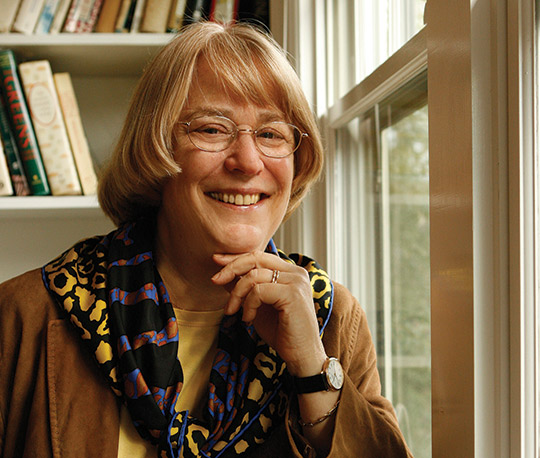Rebuilding the Social Order
Alumni Focus: Ellen Condliffe Lagemann (Ph.D. -'78, M.A. -'68) sees herself as the latest in a line of TC civic educators. That's why she's teaching behind bars.
By Joe Levine
She’s been president of the Spencer Foundation, Charles Warren Professor of the History of American Education and Dean of Harvard’s Graduate School of Education, and President of the National Academy of Education. So why is Ellen Lagemann serving time as Distinguished Fellow at the Bard Prison Initiative?
“I’ve always cared about civic education and social justice,” says Lagemann, who is also Bard College’s Levy Institute Research Professor. “Dewey believed knowledge should be evaluated according to its use. You don’t learn to be a citizen by studying the Constitution. You have to know how to do things in the world.”
As a Smith undergraduate, Lagemann worked on voter registration and raised money for shoes for children in the Mississippi Delta after attending a talk by Marian Wright (later Edelman). “I wanted to go to Mississippi, but my parents put the kibosh on that,” she recalls. At her suggestion, TC later honored Edelman for founding the Children’s Defense Fund.
Lagemann came to TC for a student teaching program at Benajmin Franklin High School in Harlem. She never participated – “They sent me off to work in Roslyn, Long Island” – but says her TC education “has deeply colored how I think, teach and view social problems. Today the fields once brought together in TC’s Division One [Philosophy and the Social Sciences] have become separate and specialized. So many people do not value history in the professional study of education, but it’s essential to an appreciation of how different social forces have melded to create the present.”
Lagemann’s advisor in the joint Columbia-TC History and Education doctoral program was Lawrence Cremin, Chair of Division One and later TC’s President, who was writing a history of educational institutions from newspapers to county fairs. Cremin had studied under TC education sociologist George Counts, who authored the Depression-era pamphlet “Dare the School Build a New Social Order?”
“There’s a direct line from Counts to Cremin to Lagemann,” Lagemann says. “Counts left his books to Cremin, and I have many of Cremin’s books. Counts wrote ‘Dare the School Build a New Social Order,’ and I’m working with the Bard Prison Initiative.”
Under Cremin, Lagemann conducted a study of education’s impact on the lives of women (including TC’s founder, Grace Dodge), later published as A Generation of Women: Education in the Lives of Progressive Reformers (1979). She subsequently joined TC’s faculty (and Columbia’s history department) and edited the Teachers College Record.
“I thought that producing editorials would push me to do a more direct, accessible kind of writing,” she says. One topic, philanthropy, became such an interest that, in 1983, Lagemann published Private Power for the Public Good: A History of the Carnegie Foundation for the Advancement of Teaching. She became Spencer Foundation President in 2000, a time, she believes, when foundations were becoming overly agenda-driven.
“When foundations shut themselves off to over-the-transom proposals, the implication is that the board knows everything and people in the field are merely implementers,” she says.
At Harvard Lagemann launched a Usable Knowledge initiative to translate research findings into practical applications for schools, colleges and policymakers. Last year, Lagemann and computer scientist Harry R. Lewis argued in Harvard Magazine that universities must once again instill “the values, ideals and civic virtues on which American democracy depends.”
Instilling those values has become Lagemann’s full-time work. “The national recidivism rate is well above 50 percent, and ours is about 4 percent,” she says of the Bard Prison Initiative. “Our people go on to graduate schools and highly paid jobs and volunteer work. Clearly we need a more porous education system, so that people who drop out or flunk out can keep coming back.”
Lagemann is writing a book on that work aimed at a general audience. “Dewey said we create democracy by educating people,” she says. “That’s Counts, that’s Cremin and that’s me, too.”
Published Thursday, Jun. 27, 2013
